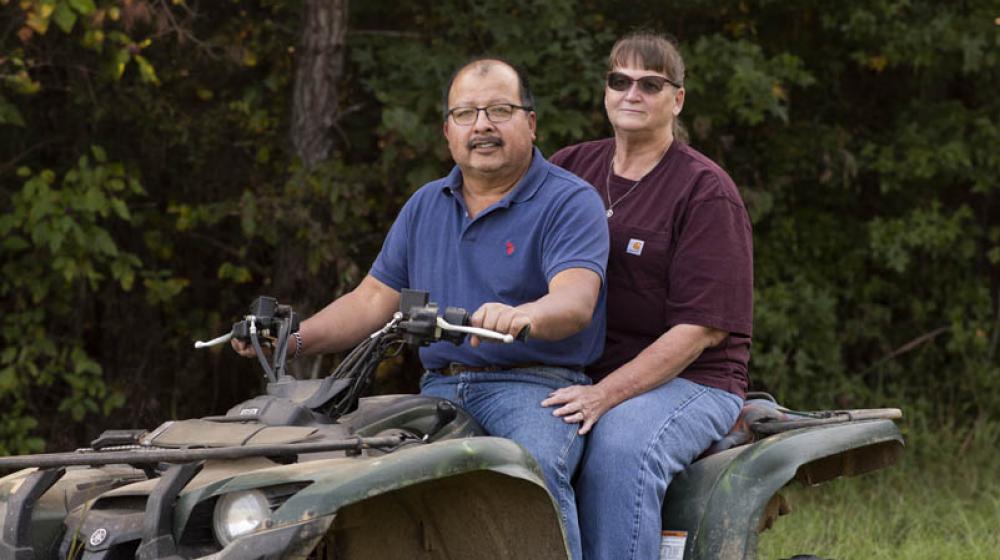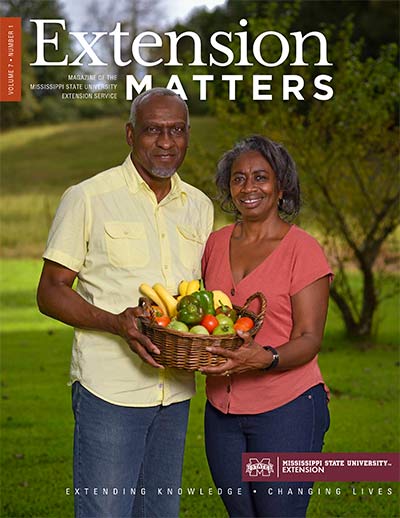Local Focus

José and Terry Barron, Extension webinar participants
Extension agent in Pontotoc County held local meetings online in 2020
Story by Nathan Gregory • Photos by Kevin Hudson
The Mississippi State University Extension Service has been part of Terry Barron’s life in many ways since she moved back to her home state more than 12 years ago.
First, she was a volunteer leader of her two sons’ 4-H club. Now, she is more of a learner as a frequent participant in Extension virtual educational meetings organized by James Shannon, an MSU Extension agent in Pontotoc County, which Barron calls home.
After it became clear to him that the effects of the pandemic would be long-lasting, Shannon said he saw the need to maintain a connection with clients in and beyond his coverage area.

productive employee.
“My initial goal was to find a way to present the programs that had been canceled due to the pandemic, so I contacted my cattle production and forestry advisory committees for guidance,” Shannon recalls. “They encouraged me to pursue Zoom sessions.”
Barron and her husband, José, became regulars at the 15 webinars Shannon scheduled to make sure Extension programming could resume, despite COVID-19 social-distancing requirements. The Zoom programs had a total attendance of nearly 400.
One of these was a meeting of the Pontotoc County Forestry Association, during which MSU Extension forestry specialist Dr. John Auel discussed timber markets, inventories, and sustainability. At this webinar, Barron spoke with Mississippi Forestry Commission representatives about management options for her family’s timberland in Choctaw County.
“The forestry commission helps landowners meet the requirements for American Tree Farm certification, which include a management stewardship plan, an application, and an inspection,” Barron explains. “I am interested in this program, but it is something I hope to discuss with my family to see if it fits for us. While we consider that, I want to do whatever we can to add value to the land.”
Extension agent in Pontotoc County holds local meetings online
- ≈ 3 webinars per month (since June)
- > 660 total attendees
- ≈ 38% agriculture
- ≈ 28% natural resources
- ≈ 25% youth life skills and leadership training
Another place where Barron is a fixture is cattle sale barns. She is an animal health technician with the USDA Animal and Plant Health Inspection Service’s Veterinary Services unit, where disease surveillance is a part of her job. She is also a member of the Pontotoc County Cattlemen’s Association.
“The more often I attend these courses, the more I enhance my knowledge to be a more productive employee,” Barron says. “I don’t work directly with the cattle industry, but one of my main jobs involves regulation. At the sale barns I visit, we check back tags for proper placement so, when cattle are harvested, we can match the identification to the correct blood samples and make sure the cattle leaving the sale barn that are going to be harvested don’t have a communicable disease.”
— Terry Barron
Shannon’s webinars focused on different areas related to Extension’s scope and various commodity groups, ranging from forestry and cattle to row crops and beekeeping, but all the meetings had a local focus.
“Two webinars I recently sat in on were about feral swine and chronic wasting disease, both of which fall under a sister agency of the one I work for, but I find it helps me to stay up to date on anything new regarding those two issues,” Barron says. “I also recently saw a presentation on how improving the genetics of your cattle can improve their marketability.
“I do miss meeting and greeting because it is nice to be able to see faces,” she adds, “but these webinars are really good because, for me, I can sit at my dining room table and watch one without having to leave home.”
Shannon said clients trust the information provided by MSU Extension, and that trust has been formed through years of delivering science-based information that works.
“Our adaptability proves that we are truly dedicated to improving the well-being and productivity of the citizens of Mississippi and that we are willing to make the effort to meet clients where they are,” he says. “This experience has opened my eyes to the usefulness of virtual programming.”


